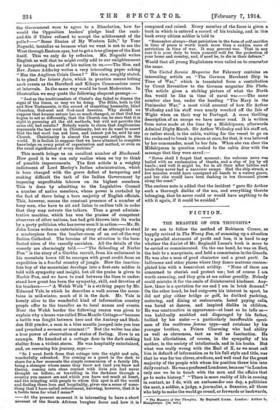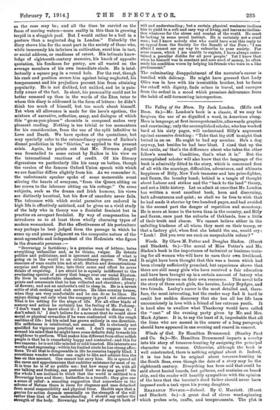FICTION.
THE MEASURE OF OUR THOUGHTS.'
IF we are to follow the method of Robinson Crusoe, so happily revived in The Wrong Boa, of summing up a situation by a parallel statement of profit and loss, it is hard to say whether the diarist of Mr. Reginald Lucas's book is more to be envied or commiserated. On the one hand, he was an Earl, the heir to a marquisate, and held a commission in the Guards. He was also a man of good character and a great parti. In ballrooms and other places where they dance matrons contem- plated him with a benevolent avidity. "None of them are concerned to cherish and protect me ; but of course I am worth annexing, and they grin at me rather greedily. Nobody could mistake it for the smile of disinterested kindness. Any- how, there is a quotation for me and I am in brisk demand." On the other hand, he had outgrown his interest in sport, he did not play either bridge or golf, he disliked yachting, motoring, and dining at restaurants, hated paying calk, was bored at dances, and inspired dislike in children. He was unattractive in appearance—at least so he tells us— was habitually snubbed and disparaged by his father, bullied by hie sister — a particularly insufferable speci- men of the maitrease femme type—and outshone by his younger brother, a Prince Charming who had ability as well as cleverness, tact as well as fascination. He had his alleviations, of course, in the sympathy of his mother, in the society of intellectuals, and in his hooka. But what was really wrong with the Earl of X, as we must call him in default of information as to his full style and title, was that he was far too clever, studious, and well read for the great majority of the people with whom his position threw him into daily contact. He was a professed Londoner, because "in London only can we be in touch with the men and the affairs that go to make history." "There is more reality of life in coming in contact, as I do, with an ambassador one day, a politician the next, soldier, a judge, a journalist, a financier, all those who help to make the world go round, or forwards or backwards, • The Measures of Ow Thoughts. By Beenild Lucas.. London: Arthur L. Humphreys. Da net.] as the case may be ; and all the time be carried on the foam of moving waters—more reality in this than in growing torpid in a sluggish pool. But I would rather be a bull in a pasture than a neglected dog in London." Unluckily the diary shows him for the most part in the society of those who, while immensely his inferiors in cultivation, excel him in tact, or social address, or readiness of retort. His intimate know- ledge of eighteenth-century memoirs, his knack of apposite quotation, his fondness for poetry, are all wasted on the average members of his own immediate circle. He is intel- lectually a square peg in a round hole. For the rest, though his rank and position secure him against being neglected, his temperament and his prejudices prevent him from attaining popularity. He is not disliked, but unliked, and he is pain- fully aware of the fact. In abort, his personality could not be better summed up than in the words of the Eton tutor to whom this diary is addressed in the form of letters: he didn't think too much of himself, but too much about himself. Yet when all allowance is made for the hero's egotism, the mixture of narrative, reflection, essay, and dialogue of which this " go-as-you-please " chronicle is composed makes very pleasant reading. Nothing is too trivial or too momentous for his consideration, from the use of the split infinitive to Love and Death. We have spoken of the quotations, but may specially refer to the extraordinary aptness of Raikes's dismal prediction in the " thirties," as applied to the present crisis. Again, he points out that Mr. Norman Angell was forestalled to some extent by Raikee in his view on the international reactions of credit. Of his literary digressions we particularly like his essay on bathos, though the version of the famous Oxford Union speech with which we are familiar differs slightly from his. As we remember it, the unfortunate speaker spoke of some memorable event stirring the hearts of everyone, "from the Queen sitting on her crown to the labourer sitting on his cottage." On some subjects, such as the drama and Irish humour, his views are distinctly heretical, but his flow of anecdote never fails. The tolerance with which social parasites are endured in high life is effectively satirized, and he gives us a vivid study of the lady who in theory was a Socialist feminist but in practice an arrogant feudalist. By way of compensation he introduces us to at least three wholly charming types of modern womanhood. But the effectiveness of his portraiture may perhaps be best judged from the passage in which he sums up and passes judgment on the composite nature of the most agreeable and independent of the Hedonists who figure in the dramatis personae :- "Brownrigg is fastidious ; is a genuine man of letters; hates
e verything unfamiliar and, as he thinks, vulgar. He detests politics and politicians, and is ignorant and careless of what is going on in the world to an extraordinary degree. Wars and rumours of wars excite him not at all. Strikes and demonstrations surprise and disgust him; into their cause and effect he never thinks of enquiring. I am afraid he is equally indifferent to the everlasting spectre of misery that hangs over our social Elysium. He lives in comfortable chambers, with an excellent library; prints and ornaments that he has collected and cherishes ; plenty of flowers; and not an anchorite's cell to sleep in. He is a severe critic of club cooking and club service. Be likes country houses, when they are very comfortable and he can do as he likes. He enjoys dining out only when the company is good: not otherwise. That is his setting for the stage of life. For all other kinds of scenery and action he certainly has the feeling of Mr. Podsnap:
' I don't want to know about it: I don't choose to discuss it: I don't admit it.' I don't believe for a moment that he would show moral or physical cowardice if he were confronted with the rough realities of life : bat his mind has grown entirely in one direction. His selfishness is intellectual, not sensual. He is obviously not qualified for vigorous practical work. I don't suppose it ever grossed his mind that he might have some definite duty towards his neighbour to perform. What makes him different from other selfish people is that he is remarkably happy and contented: and this for two reasons: he is not idle-minded or cold-hearted. His interests are worthy and engrossing within his limited circle he has strong offer- tiells. To all that is disagreeable in life heremains happily blind. I sometimes wonder whether one ought to like and admire him the leas on this account, One cannot but envy him. He is spared all the cares and apprehensions that embitter existence for most of us. It is true he is of no public use: but how many of us, with all our talking and fretting, can pretend that we do any good P On the whole I am inclined to think that the world is entitled to a Brownrigg here and there: butterflies in a tumult: they give one a sense of relief a consoling suggestion that somewhere in the scheme of Nature there is room for elegance and ease detached from moral responsibility and physical force. Haalitt says that a genius for action depends essentially on the strength of the will rather than that of the understanding. I should say rather the strength of the body. Brownrigg has plenty of strength both of will and understanding; but a certain physical weakness inclines him to yield to a soft and easy way of living, and leaves no inclina- tion whatever for the stress and combat of the world. He must be lacking in some moral instinct. He is certainly not a cruel man ; but I know nobody else who could have sent this reply to an appeal from the Society for the Benefit of the Poor: ' I am afraid I cannot see my way to subscribe to your society. For some reason, which I am unable to explain, I have always enter- tained a peculiar dislike for all poor people.' Yet I know that when he himself was in constant and sore need of money, ho often made his condition worse by helping his friends who were in a like predicament."
The culminating disappointment of the narrator's career is handled with delicacy. He might have guessed that Lady Olive was in love with his irresistible brother, but he faces the rebuff with dignity, finds solace in travel, and emerges from the ordeal in a mood which promises deliverance from the habit of self-tormenting introspection.











































 Previous page
Previous page